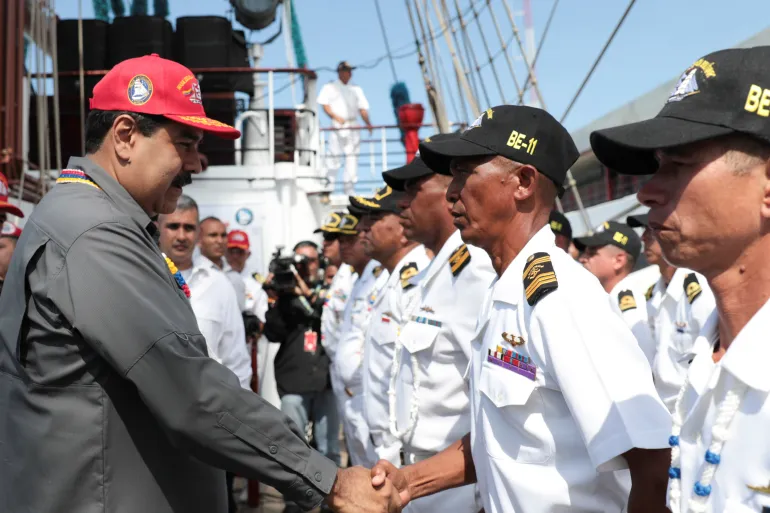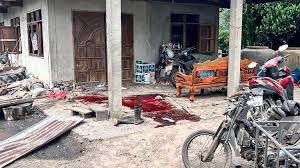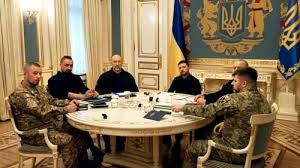Tensions in the Caribbean reached a boiling point this week as Venezuela deployed warships and surveillance drones in response to a formidable U.S. naval buildup off its northern coast. The move follows Washington’s high-profile crackdown on Latin American drug trafficking—one that Caracas calls a thinly veiled attempt at regime change.
On Tuesday, Venezuelan Defence Minister Vladimir Padrino took to social media to announce a “significant” increase in maritime patrols along the Caribbean coastline. This includes deploying larger naval vessels deeper into Venezuela’s territorial waters, bolstered by a fleet of military drones to monitor U.S. movements.
“We are not intimidated. We are defending sovereignty, not provoking war,” Padrino declared.
The escalation comes just days after the U.S. dispatched an amphibious naval squadron toward Venezuela’s maritime border. The Pentagon claims the deployment—comprising three warships, a nuclear-powered fast-attack submarine, and over 4,500 U.S. personnel, including 2,200 Marines—is part of a multi-nation operation targeting regional drug cartels.
But Venezuelan President Nicolás Maduro sees it differently.
U.S. President Donald Trump, now in his second non-consecutive term, reignited hostilities with Maduro’s administration, accusing the Venezuelan leader of being a kingpin in the international cocaine trade. The White House doubled its reward for Maduro’s capture or conviction from $25 million to $50 million. A similar $25 million bounty was placed on Diosdado Cabello, Venezuela’s powerful Interior Minister.
The U.S. claims Maduro and his allies lead the Cartel de los Soles, a powerful and shadowy cocaine trafficking network that it now labels a terrorist organization. However, Mexico, one of Washington’s key regional allies, said earlier this month that it found no credible evidence linking Maduro to the Sinaloa Cartel or any major trafficking syndicate.
Maduro flatly rejected the accusations on national television Monday night, calling them “pathetic lies” and “desperate propaganda.”
“We are free of coca plantations and free of cocaine production. The U.S. should look at its own backyard,” Maduro said, referring to America’s growing opioid and fentanyl crisis.
In response to what he called “imperialist threats,” Maduro launched a national campaign to mobilize local militias. Thousands of Venezuelans have since volunteered to join paramilitary units, forming part of what the president describes as a “people’s army.”
The government has also sent 15,000 troops to the Colombian border in an attempt to disrupt the operations of cross-border criminal groups. In Venezuela’s northeast, authorities claim to have dismantled clandestine shipyards used to build semi-submersibles for drug transport.
A new layer of concern emerged when news broke of the U.S. deploying a nuclear-powered submarine to the Caribbean, a move Venezuela described in a letter to the United Nations as “a direct act of intimidation” and “a serious threat to regional peace.”
Caracas urged the UN Security Council to demand “firm guarantees” that nuclear weapons would not be introduced or used in the region.
Despite the military muscle-flexing, international analysts are skeptical about the possibility of a U.S. invasion. According to Phil Gunson of the International Crisis Group, Washington’s tactics appear aimed at psychological pressure rather than actual warfare.
“This looks like a calculated show of force to rattle Maduro’s inner circle and potentially force him to the negotiating table,” Gunson said.
In Latin America, reactions are mixed. Colombia, traditionally aligned with Washington, has increased security along its western border. Meanwhile, Mexico has criticized the U.S. escalation and reiterated its stance of neutrality.
This isn’t the first time Trump has taken aim at Maduro. During his first presidency (2017–2021), he imposed severe economic sanctions, recognized opposition leader Juan Guaidó as Venezuela’s legitimate president, and even floated the idea of military intervention.
Despite these efforts—and an oil embargo that battered the Venezuelan economy—Maduro has remained in power. He secured a controversial third term in July 2024, following elections widely dismissed as undemocratic by international observers.
Critics argue that the renewed American aggression has less to do with narcotics and more to do with geopolitical posturing. With Venezuela home to the largest proven oil reserves in the world and increasing cooperation with Russia, Iran, and China, some say Trump’s motives lie in reasserting U.S. dominance in the hemisphere.
As military hardware gathers off the coast of Venezuela and both governments double down on rhetoric, the region teeters on the edge of a crisis. Yet on the streets of Caracas, life goes on. Many Venezuelans, hardened by years of political unrest and economic hardship, view the latest standoff as yet another round in a long geopolitical chess game.
“The U.S. won’t invade. They’ll bark and bark,” said Carlos Reyes, a 42-year-old teacher in Caracas. “But we’ve learned to live under pressure. This is just another day in Venezuela.”
Only time will tell whether this standoff ends in dialogue—or detonates into something far more dangerous.



